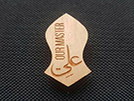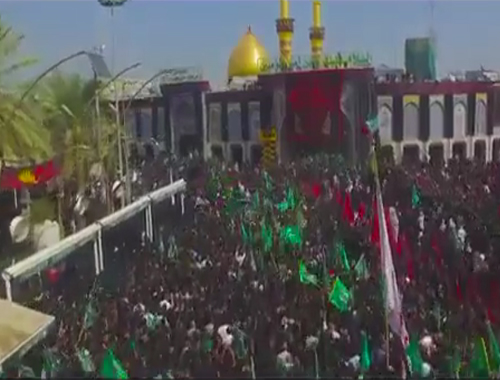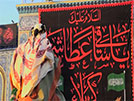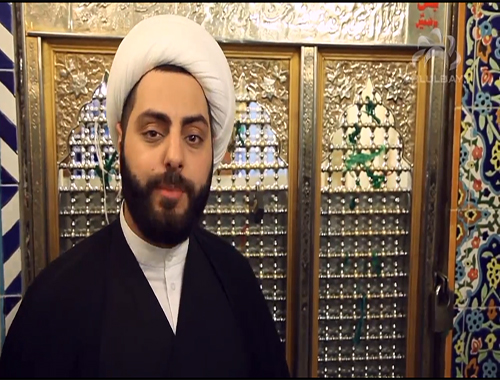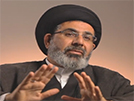Additional Proofs For'ali's Caliphate
- Details
- Hits: 7381
ADDITIONAL PROOFS FOR 'ALI'S CALIPHATE
In al-Tirmidhi's Sahih, relying on the isnad of 'Imran ibn Hasin, the latter says, "The Messenger of Allah (a.s) dispatched an army under the command of 'Ali ibn Abi Talib (a.s). The campaign was carried out, and 'All (a.s) won a female captive as his share of the booty. Some people faulted him for doing so. Four of the companions of the Messenger of Allah (a.s) pledged to complain against him to the Prophet (a.s). With signs of anger on his holy face clearly visible, the Messenger of Allah (a.s) said to them,
"What do you want from 'Ali? 'All is from me, and I am from 'Ali, and he is the 'Vaster of every believer after me."1
And consider the following verse of the Almighty:
"Your Master is Allah and His Messenger and the Believers who uphold prayers and pay zakat even while prostrating (Qur'an, 5:58)."
Most Sunni scholars of exegesis have stated that it was revealed in honor of 'All (a.s) when he gave his ring by way of charity, as he was prostrating during his performance of the prayers, to a poor man. In al-Bukhari's Sahih, Mus'ab ibn Sa'd quotes his father saying, "The Messenger of Allah (a.s) marched out to TAbuk after having left 'Ali (a.s) behind. 'Ali (a.s) said to him, 'Are you going to leave me with the children and the women?' He (a.s) said to him,
'Are you not pleased that your status to me is like that of Aaron to Moses except there shall be no prophet after me?'" 2
This tradition proves that 'Ali (a.s) had all the positions occupied by Aaron (a.s) among the Children of Israel with the exception of prophethood and which is explained by the Almighty, Praise and Exaltation are His, in these verses:
"And give me a minister from my family, Aaron, my brother. Add to my strength through him, and mae him
________________________
1 Al-Tirmidhi, Sahih, Vol. 2, p. 297.
2 Al-Bukhari, Vol. 5, p. 492, the book of military campaigns.
--------------------------------------------------------------------------------
( 39 )
share my task: So that we may celebrate Your praise without stint and remember You without stint: For You are He Who (ever) regards us.' (Allah) said, 'Your prayer is granted, 0 Moses!'"
It is clear from these verses that Aaron (a.s) was a vizier of Moses (a.s), a special aide and a partner in leading the nation.
What emphasizes this lofty status in his appointment as the caliph of the nation is that he was the most knowledgeable among all the sahabah according to what al-Bukhari narrates from 'Umar ibn alKhattab. Ibn 'Abbas has said, "'Umar said,
'The one who recites the Qur'an the best is my father, while the most judicious among us is 'Ali." 1
One who is the most knowledgeable of the injunctions and the laws, as is well known, is the one who makes the best judge. Suffices to prove that he is the most knowledgeable among all the companions and the wisest is that he was the gate of the city of knowledge of the Messenger of Allah (a.s). In Mustadrak al-Sahihayn, relying on the isnad of Ibn 'Abbas, the Messenger of Allah (a.s) said,
"I am the city of knowledge and 'All (a.s) is its gate. Whoever seeks knowledge has to approach through the gate." 2
In al-Tirmidhi's Sahih, the Messenger of Allah (a.s) is quoted as having said,
"I am the city of wisdom and 'Ali is its gate." 3
In Mustadrak al-Sahihayn, it is stated that the Messenger of Allah (a.s) said to 'Ali (a.s),
"You must explain to my nation after me anything wherein they differ."4
The Messenger of Allah (a.s) even made the mark of hating 'Ali
________________________
1 Al-Bukhari, Sahih, Vol. 6, p. 1.0, in the book of exegesis.
2 Mustadrak al-Sahihayn, Vol. 3, p. 126.
3 Al-Tirmidhi, Sahih, Vol. 2, p. 299.
4 Mustadrak al- Sahihayn, Vol. 3, p. 122.
--------------------------------------------------------------------------------
( 40 )
(a.s) as one of the indications of hypocrisy as is clear from the narrative included by Muslim in his Sahih with its isnad to 'Ali (a.s) who said,
"By the One Who split the seed and created the breeze, it is a covenant from the Ummi Prophet (a.s) to me that none loves me except a believer (mu'min) and none hates me except a hypocrite." 1
Even if the Prophet (a.s) did not appoint a successor after him, is not the nation supposed to choose the one who has the most knowledge and with the most distinctions in order to be its leader? We have already clarified that 'Ali (a.s) was the most knowledgeable among the companions. They used to refer to him whenever they confronted a complex theological problem. Similar to this is included by Alai Dawud in his isnad to Ibn 'Abbas who said, "'Umar brought a mentally retarded woman who had committed adultery. He consulted some people in her regard. 'Umar ordered her stoned. 'Ali ibn Abi Talib (a.s) passed by her and inquired about her. He was told that she was a mad woman by so-and-so who had committed adultery, so she was ordered to be stoned. He told them to take her back. Then he went to him [to 'Umar] and said to him, '0 'Umar! Don't you know that judgment against three categories of people is lifted: the mad person until he ° recovers, the one sleeping until he wakes up and the child until he attains mental maturity?' He said, 'Yes.' 'Ali (a.s) said, 'Then what is the matter with this woman that she should be stoned?' 'Umar said, 'Nothing.' She was sent back. 'Umar kept making takbir —uttering the statement 'Allähu-Akbar (Allah is the Most Great)'—." 2 Al-Bukhari, too, includes part of the same incident in his own Sahih. 3
________________________
1 Muslim, Sahih, in the book of iman, in a chapter about loving Ali, Allah glorified his countenance, one of the dignitaries, Vol. 1, p. 262 (Dar al-Sha'b edition).
2 Ibn Sunan, in a chapter about a mad person stealing or being penalized according to the Shari'ah.
3 Al-Bukhari, Sahih, the book of warriors, in a chapter about a mad man or woman should not be stoned.
--------------------------------------------------------------------------------
( 41 )
Moreover, Imam 'Ali (a.s) was famous as the "Imam of the ascetics" and he was also famous for his courage and extraordinary daring feats. He was the first commando in Islam. In every Islamic battle, he played a decisive role on the side of the Messenger of Allah (a.s). In the Battle of Badr, he killed with his sword, Dhu'lFiqar, thirty Quraishite heroes. In the battles of Uhud and Hunayn, he undertook a historic stand, jeopardizing his own life in defense of the Messenger of Allah (a.s) following the flight of the vast majority of the sahabah! In the Battle of Khandaq (moat), he stood to duel the giant of the polytheists, namely 'Amr ibn 'Abd Wudd al' Amiri, whom he killed at the time when none of the other sahabah dared to face him although the Messenger of Allah (a.s) had three times called upon them to do so. He (a.s) finally permitted 'Ali (a.s) to face the man although 'Ali (a.s) was quite young compared to most sahabah. In the battle for Khaybar, Allah granted victory at his hands, so he was able to open the gate of the fort after the Muslims at the time could not do so. A large number of the sahabah failed collectively to open it.
Imam 'Ali (a.s) distinguished himself from the other sahabah by the fact that the time of jahiliyyah (Time of Ignorance—the pre-Islamic era) did not pollute him with its idols. He received his unique upbringing at the hands of the First Teacher of Humanity, Muhammed (a.s), from whom he did not part for one moment as long as the Prophet (a.s) lived. When the Prophet (a.s) passed away, 'Ali (a.s) was tending to him. He, therefore, remained all his life receiving knowledge and wisdom from the Messenger of Allah (a.s). Hence, he deserved to be the gate of the city of knowledge of the Prophet (a.s), of his wisdom, and his brother. Al-Bukhari narrates in his Sahih, relying on the isnad of 'Abdullah ibn 'Umar saying, "The Prophet (a.s) established ties of fraternity among his companions. 'Ali (a.s) came with tearful eyes and said, '0 Messenger of Allah! You have established ties of fraternity among your companions but did not establish a tie of fraternity between me
--------------------------------------------------------------------------------
( 42 )
and anyone else.' The Messenger of Allah (a.s) said,
'You are MY brother in the life of this world and in the Hereafter.'" 1
The Prophet (a.s) even considered 'Ali (a.s) as being of him as alBukhari has narrated: "The Prophet (a.s) said to 'Ali (a.s),
'You are of me, and I am of you.'" 2
'Ali (a.s) distinguished himself from the rest of the sahabah by acquiring the most merits as we are told by al-Hakim in his Mustadrak where he quotes Ahmed ibn Hanbal saying,
"None among the companions of the Messenger of Allah (a.s) acquired as many virtues as 'Ali son of Abu Talib (a.s)." 3
And in Kanz al-'Ummal, the Messenger of Allah (a.s) is quoted as having said,
"Allah ordered me to marry Fatimah (a.s) off to 'Ali." 4
This happened after having rejected the offer of marriage from a number of the sahabah who sought her hand in order to earn the great honor of marrying a lady who was "part" of the Messenger of Allah (a.s), the Head of the Believing Women and of the residents of Paradise, the lady because of whose anger Allah would be angry. It is quite true what one said: "Had 'Ali (a.s) not been created, Fatimah (a.s) would have had no match for marriage." 5
Having stated all the above, had the selection of the caliph been truly in the hands of the people, 'Ali (a.s) was the most distinguished among the sahabah, hence he was the most deserving of the caliphate.
________________________
1 Al-Tirmidhi,Sahih, Vol. 2, p. 299.
2 Al-Bukhari, Sahih, Vol. 5, p. 43, in the book of the virtues of the sahabah.
3 Mustadrak al- Sahihayn,Vol. 3, p. 107.
4 Kanz al-Ummal, Vol. 13, hadith 37753.Dhakha'ir al-Uqba.
5 Al-Manawi, Kunuz al-Haqa'iq. It is also recorded by al-Daylami.
--------------------------------------------------------------------------------
( 43 )
The Majority Of The Muslims Went Against The Ahadith Relevant To Imamate
We have already explained the evidences proving that mastership is the right of the Ahl al-Bayt (a.s) in general, that the Twelve Imams (a.s) from among them were to be the caliphs over the nation, starting with Imam 'Ali (a.s), following the departure of the Chosen One, Muhammed (a.s), to the Most High Companion. One decisive question remains to be answered in order to remove a great deal of the ambiguity that coincided with the tale of the dispute between Ahl al-Sunnah and the Shi'ahs throughout the Islamic history. The question is: "If the previous texts truly prove the Imamate of the Ahl al-Bayt (a.s), why and how did the caliphate become the lot of others? Were not the sahabah following the Prophet (a.s) in everything in which he ordered them?"
In order to answer this question, we have to bring about some important historical events at the dawn of Islam which had the major impact in altering the direction of the Islamic history, letting the reader pass his own judgment thereafter. Among the weighty events were the following:
1. Some sahabah prohibited the Messenger of Allah (a.s) from writing his will.
2. Some sahabah lagged behind and did not join Usamah's military campaign, casting doubts about his leadership.
3. Events of the saqifah and the swearing of allegiance to Abu Bakr
4. Caliphate of 'Umar
5. Caliphate of 'Uthman
6. Battle of the Camel and the march of 'A'ishah, the Mother of the Faithful 1
________________________
1 In the Holy Qur'an (33:6), Almighty Allah says, "The Prophet has a greater claim on the faithful than they have on themselves, and his wives are as their mothers. " Accordingly, the Prophet's wives were called 'the mothers of the faithful.'
--------------------------------------------------------------------------------
( 44 )
7. Battle of Siffin and the rebellion of Mu'äwiyah
8. Martyrdom of Imam 'Ali (a.s)
9. Reconciliation treaty and the martyrdom of Imam al-Hasan (a.s)
10. Kerbala' Revolution and the Martyrdom of Imam al-Husain (a.s)
We will discuss each of these events in some details as follows:
--------------------------------------------------------------------------------
( 45 )
SOME SAHABAH PROHIBITED THE MESSENGER OF ALLAH (A.S) FROM WRITING HIS WILL
In his al-Bukhari records six narratives about this incident which took place four days only before the demise of the Prophet (a.s). Ibn 'Abbas (r.a) is quoted as having said,
"Thursday! What a Thursday it was! The pain of the Messenger of Allah (a.s) intensified, so he said, 'Bring me something so I may write for you a document that will never let you stray thereafter.' They disputed with each other, and nobody should dispute near a prophet. They said, 'What is the matter with him?! Has he hallucinated? Inquire of him.' They went to him, whereupon he said, 'Leave me alone, for the pain in which I am is better than what you are attributing to me.'" 1
In another narrative, Ibn 'Abbas is quoted as having said,
"When death approached the Messenger of Allah (a.s), and there were men in the house, the Prophet (a.s) said, let me write for you a document after which you shall never stray.' Some of them said, 'The Messenger of Allah (a.s) has been overcome by pain, and you have with you the Qur'an. Suffices us the Book of Allah.' The people of the house differed with each other and disputed. Some of them said, 'Come close to him so he may write you a document after which you shall never stray,' while others repeated what Umar had said. When their fuss and dissension intensified, the Messenger of Allah (a.s) said, 'Get away!'"
Ubaydullah said, "Ibn 'Abbas used to say, 'The real calamity, the whole calamity, is what stopped the Messenger of Allah (a.s) from writing that document for them because of their dissension and arguing.'" 2
________________________
1 Al-Bukhäri,Sahih, Vol. 5, p. 511, in the book about military campaigns in a chapter about the sickness and death of the Prophet (a.s).
2 Ibid., Vol. 5, p. 512, in the book of campaigns, in a chapter about the sickness and death of the Messenger of Allah (a.s).
--------------------------------------------------------------------------------
( 46 )
According to a third narrative, Ibn 'Abbas said,
"When death approached the Messenger of Allah (a.s), and there were men in the house including 'Umar ibn alKhattab, the Prophet (a.s) said, let me write you something after (the writing of) which you shall never stray.' Umar said, 'The Prophet (a.s) has been overcome by pain, and you have with you the Qur'an. Suffices us the Book of Allah (a.s).' The people at the house disputed with each other and disagreed. Some of them were saying, 'Get close [to the Prophet (a.s)] so the Prophet (a.s) may write you a book after which you shall never stray,' while others repeated what Umar had said. When their fuss and dispute near the Prophet (a.s) intensified, the Messenger of Allah said, 'Get away!' Ubaydulldh said, 'Ibn 'Abbas used to say that the calamity, the whole calamity, is what stopped the Messenger of Allah (a.s) from writing them such a document because of their dispute and fuss.'" 1
In Muslim's Sahih, their response was:
"... they said that the Messenger of Allah (a.s) was hallucinating." 2
In another narrative, the following is stated:
"... 'Umar made a statement indicating that the pain had overcome the Messenger of Allah (a.s) then said, 'We have with us the Qur'an. Suffices us the Book of Allah." 3
As you can see, the word "hallucinating" was replaced in this latest narrative with a more polite reference to pain.
Discerning the above-quoted narratives, we become certain that the first person who ascribed hallucination to the Messenger of Allah (a.s) was 'Umar ibn al-Khattab and who was supported by some
________________________
1 Al-Bukhari, Sahih, Vol. 7, p. 389, in the book of the sick in a chapter about a sick person saying, "Get away from me!"
2 Muslim, Sahih, in the book of wills in a chapter about not leaving a will when one has nothing to leave behind, Vol. 4, p. 175.
3 Abu Bakr al-Jawahiri, AI-Saqifah.
--------------------------------------------------------------------------------
( 47 )
sahabah who were present there, causing the Messenger of Allah (a.s) to be angry and to dismiss them with "Get away from me!"
The truth is that this incident gives the impression which permits no doubt that the dignity of the Gracious Messenger of Allah (a.s) was harmed. This brought me a great shock when I came to know about it and, I believe, the vast majority of Sunnis are ignorant of it despite the horrors of its implications. Many individuals to whom I related this incident did not believe it because of the weight of the shock. One of them even solemnly swore that if there was any possibility at all that such an incident is, indeed, recorded in Bukhari's Sahih, he will never trust any other narrative in such Sahih. Some of them believed this incident but, having come to know that caliph 'Umar was the first to charge the Messenger of Allah (a.s) with hallucination, became extremely angry and refused to believe it. They even went as far as not trusting al-Bukhari nor any of the books of hadith which narrate incidents such as this that tarnish the image of the "righteous ancestors (al-salaf al-salih) according to his view.
The secret behind the amazement in this incident is that all the sahabah who were then present should have given priority, without any delay, to what the Messenger of Allah (a.s) had ordered them to do so that he could write for them his last will, the will that carried the destiny of including what would bring the Muslims after his demise security against straying, if they upheld and obeyed, as is clear from this narrative.
Who, from among the Sunnis, could expect that the last meeting between the Prophet (a. s) and the senior sahabah would end up in his dismissal of them after they had bidden him farewell in such a pain-inflicting word which could have only one single implication? This implication is mentioned by al-Nawawi in his Sharh [commentary] of Muslim's Sahih. This implication is stated there as nothing other than "hallucination"; we seek refuge with Allah.
According to Imam Sharaf ad-Din, "If you contemplate on the statement of the Prophet (a.s) wherein he says, 'Bring me something
--------------------------------------------------------------------------------
( 48 )
so I may write for you a document after [the writing of] which you shall never stray' and his statement in the hadith of the Two Weighty Things wherein he says, 'I have left among you that which, if you uphold it, you shall never stray: the Book of Allah (a.s) and my 'itrah, my Ahl al-Bayt (a.s)', you will learn that the objective of both ahadith is one and the same. During his sickness, the Messenger of Allah (a.s) wanted to write for them the details of what the hadith of the Two Weighty Things obligates, but he changed his mind about writing it following their statement with which they surprised him and which forced him to change his mind lest some people should succeed in opening a gate to cast doubt about the Prophethood. This is so because no effect for such writing remained except dissension and disagreement after him whether he "hallucinated" in what he wrote or not; we seek refuge with Allah, since they disputed in this regard in his own presence as the previous traditions demonstrate. They contented themselves with what they have of the Qur'an, justifying their turning away from carrying out what the Prophet (a.s) had told them to do as he was in a condition of sickness. It is as though they had forgotten what the Almighty had said about His Glorious Prophet (a.s): "... Nor does he say (anything) of (his own) desire. It is no less than inspiration sent down to him: He was taught by One mighty in power" (Qur'an, 53:3-5) as well as in the following verse: "What Allah has bestowed on His Prophet (and taken away) from the people of the towns belongs to Allah, to His Prophet, and to kindred and orphans, the needy and the wayfarers, so that it may not be taken in turn by the rich among you. So take what the Prophet assigns to you, and abstain from what he withholds from you" (Qur'an, 59:7) as well as in this verse: "Truly this is the word of a most honorable messenger, endowed with power, with rank before the Lord of the throne, with authority there, (and) faithful of his trust. And (0 people!) your Companion is not possessed." (Qur'an, 81:22). 1
Ibn 'Abbas described the latter situation very well when he said,
________________________
1 Excerpted from Al-Mure lja'at of Sharaf ad-Din Sadr ad-Din al-MUsawi.
--------------------------------------------------------------------------------
( 49 )
"The calamity, the whole calamity, is what stopped the Messenger of Allah from writing that document for them because of their disputing and fussing."
Despite all of this, and according to what Ibn 'Abbas had narrated and what al-Bukhari had included in his Sahih, the Messenger of Allah (a.s) did not die before making this statement:
"... Leave me alone, for the pain in which I am is better than what you are attributing to me."
Then he enjoined them, by way of a will, to uphold three things: to get the polytheist people out of the Arabian Peninsula, to treat the envoy as handsomely as he [the Prophet (a.s)] used to do, and he abstained from mentioning the third one, or he said that he forgot it!" 1
It is certain that the Messenger of Allah (a.s) had articulated these recommendations in the presence of his family and some of his relatives, including 'Abdullah ibn 'Abbas, his cousin, in one of the four days which followed the day of the calamity, the Thursday Calamity. But what is odd is that the third item on the will, based on the integrity of al-Bukhari, is not mentioned by Ibn 'Abbas because he was too reluctant to do so. At any rate, the Shi'ah, according to the narratives of the Ahl al-Bayt (a.s), have stated that the " forgotten" issue or the one shrouded with silence is the appointment of 'Ali (a.s) as the caliph.
Some sah'abah Lagged Behind Usämah's Military Expedition and Cast Doubts about His Leadership
All Muslims know that the Messenger of Allah (a.s) tied the knot for the military expedition under the command of Usamah son of Zayd to invade the Romans. Usamah was then seventeen. This was the last military expedition during the lifetime of the Prophet (a.s). None from among the prominent Muhajirtin 2 and Ansar, 3 such as
________________________
1 Al-Bukhdri, Sahih, Vol. 5, p. 511, in the book of campaigns in a chapter about the sickness and the demise of the Prophet (a.s).
2 MuhajirEin (singular: muhäjir, migrant) is a title exclusively said to the people of Mecca who followed the Holy Prophet and had to migrate to Yathrib (later al‑ Madinah) because of the persecution they had suffered at the hands of the polytheists of Mecca.
3 Ansar are the people of Yathrib (al-Madinah) who accepted, supported, and
received the Holy Prophet and the emigrants of Makkah (Muhajirun).
--------------------------------------------------------------------------------
( 50 )
Abu Bakr, 'Umar, Abu 'Ubaydah, Sa'd and their likes, was excluded from being enlisted by the Prophet 1. This fact is unanimously accepted by writers of biographies and of history books; it is taken for granted. The Prophet (a.s) ordered Usamah to march, but they dragged their feet, and some of them cast doubts about his leadership, so much so that the Messenger of Allah (a.s) ascended the pulpit, as al-Bukhari records according to his reliance on Ibn 'Umar, to address them. The latter says, "The Messenger of Allah (a.s) placed Usamah as commander of the people. They cast doubts about such an appointment, so he (a.s) said, 'If you cast doubts about his appointment, you did, indeed, cast doubt about the appointment of his father before him. By Allah! He [his father] was worthy of being in charge, and he was among the people whom I loved the most, and this one [his son] is the one I love the most after him.'2 Then he (a.s) urged them once more to march and to hurry," but they again dragged their feet. The Messenger of Allah (a.s) passed away before they marched out.
From this incident, we deduct the following:
1. Some sahabah followed their own ijtihad 3 despite the presence of
________________________
1 Khalid Muhammed Khalid, Men Hawl al-Rasul (Around the Prophet), p. 548, 8thed. Al-Tabari, Tarikh. Ibn al-Athir. Ibn Sa'd, Tabaqat.
2 Al-Bukhari, 410, Vol. 5, p. 387, in the book of military campaigns in a chapter about the campaign of Zayd son of Harithah.
3 Ijtihad is a polysemous term in the Muslim jurisprudence. Lexically, it means the exertion of efforts in the attainment of a matter. In the initial emergence of Ijtihad and the sense mentioned in the text involved, it took the meaning of the dependence on personal views and the issuance of personal judgments in the religious issues even if this would violate the sources of the Islamic laws since such judgment would agree with the interest, or the public interest. In the Sunnite jurisprudence, Ijtihad means the independent or original interpretation of problems not precisely covered by the Holy Qur'an, the Holy Sunnah, and the other sources of the Islamic law from the viewpoint of the Sunnite scholars, such as analogy (Qiyds), consensus (Ijma)... etc. In the Shiite jurisprudence, Ijtihad means the exertion of all possible efforts in the deduction of the religious laws from their sources. To sum it up, the concept of Ijtihad in the Sunni doctrine is different from it in the Shi'ite. While it stands for the personal conclusion in the Sunni doctrine, it has its definite principles and fundamentals that cannot be contravened and are based upon Divine texts in the Shiite doctrine.
--------------------------------------------------------------------------------
( 51 )
a statement made by the Prophet (a.s), objecting to his appointment of Usamah over them on account of his young age although the Messenger of Allah (a.s) had tied his flag with his own hand. If we understand all of this, it will be difficult for us to understand how and why they followed their own Ijtihad with regard to bigger issues such as the caliphate of 'Ali (a.s) and his being the Imam as you will see later.
2. The appointment by the Prophet (a.s) of Usamah as their military leader although he was only seventeen was a practical lesson for the sahabah in the issue of accepting the leadership of someone who is younger than them especially since signs of his extreme anger became evident when they cast doubts about his choice of the young man as their military field commander.
3. When the Messenger of Allah (a.s) tied the knot for Usamah, he knew that he was about to depart to the most Exalted Companion, and undoubtedly he was contemplating on the dispute over the caliphate that would follow; therefore, his extreme wisdom dictated that senior Muhajirun and Ansar should be placed in that detachment which he (a.s) ordered to march out only a few days before his demise so that there would be no time to dispute over the leadership issue, let alone using ijtihad in its regard.
'Ali (a.s) kept the Prophet (a.s) company during the entire period of his sickness. After the demise of the Prophet (a.s), 'Ali (a.s) remained busy giving him his burial bath while the Muhajirun and the Ansar went to the shed (saqifah) of Bani Sa'idah to dispute with one another about the issue.of leadership after having dragged their feet and refused to march out in the military campaign of Usamah in which they had already been enlisted apparently out of their own Ijtihad and "worry" about what would happen in their absence after the death of the Prophet (a.s)! Thus, it is difficult to accept or to
--------------------------------------------------------------------------------
( 52 )
absorb the issue of the refusal of some sahabah to accept 'Ali ibn Abi Talib (a.s) as their imam; otherwise, how can one interpret the refusal of the same folks of Usamah as their leader and their casting doubts about it although it, too, was issued as an order by the Messenger of Allah (a.s)? Since both incidents of the "Thursday Calamity" and the casting of doubt about the commandership of Usamah took place during the lifetime of the Prophet (a.s), bearing in mind all the horrors of their implications, what would one expect to happen after his own demise?!
The Saqifah Events and Abu Bakr's Inauguration
While 'Ali (a.s) and those in his company from among the relatives of the Messenger of Allah (a.s) were busy making preparations for the burial of the Prophet (a.s) after his departure from this life, 'Umar ibn al-Khattab announced his rejection of the notion that the Prophet (a.s) had already died and threatened to kill anyone who said otherwise. He did not believe that he (a.s) had died until Abu Bakr returned from a place outside Madinah called al-Sankh. As mentioned by al-Bukhari in his relying on 'A'ishah, the latter said, "The Messenger of Allah (a.s) died when Abu Bakr was at alSankh." Isma'il says, "She means the highland. " 'Umar kept saying, "By Allah! The Messenger of Allah (a.s) did not die!" 'A'ishah went on to say, "'Umar also said, 'By Allah! Never did I like anything except that, and Allah shall send him back, and he will cut off men's hands and legs." Abu Bakr came, uncovered the face of the Messenger of Allah (a.s) and kissed him. Then he said, "My father and mother be sacrificed for you! You are good alive and dead! By Allah Who holds my soul in His hand, Allah shall never permit you to taste death twice," then he left as he said, "O one who keeps swearing [meaning 'Umar]! Do calm down!" 1
As for the Ansar, they met at their shed, that is, "the Saqifah of Bani Sa'idah," and nominated Sa'd ibn 'Abadah to succeed the
________________________
1 Al-Bukhäri„S'ahih, Vol. 5, p. 13, in the book about the virtues of the sahabah it a chapter about If you find no prophet, Abu Bakr, ..."
--------------------------------------------------------------------------------
( 53 )
Messenger of Allah (a.s) as the man in charge. When senior Muhajirun (i.e. Abu Bakr, 'Umar and Abu 'Ubaydah) came to know about it, they immediately went there and announced that they themselves were worthier of it. An argument arose between the Muhajirun and the Ansar wherein a dispute erupted. Sa'd ibn 'Abadah, leader of the Ansar, stood up and said, "We are the supporters of Islam and its regiment while you, folks of the Muhajirun, are his kinsfolk. A drummer from among your people has beaten its (i.e. war) drum, hence they want to reduce us from our own roots and to hold us back from the matter.'" 1
Abu Bakr stood up and delivered a speech in which he referred to the merits of the Muhajirun, deriving his argument from their descent from Quraish in order to prove their being worthier of the caliphate as al-Bukhari mentions in shis "... so Abu Bakr alSiddiq, 'Umar ibn al-Khattab and Abu 'Ubaydah ibn al-Jarrah went to them. 'Umar started to talk, but .Abu Bakr silenced him." 2
Bakr said, "... No; but we are the princes while you are the viziers. But we are the princes and you are the viziers. And they are the best among the Arabs in status and in lineage 3 ..., and I have recommended for you one of these two men." 4 So they swore the oath of allegiance to 'Umar ibn al-Khattab or to Abu 'Ubaydah ibn al-Jarrah 5. One of the prominent Ansar, namely al-Habbab ibn alMundhir, responded to him by saying, 'No by Allah, we shall not do that! One of us shall be an amir and one of you [too] shall be an
________________________
1 A1-Bukhari, Sahih, Vol. 8, p. 541, in a book about the fighters from among the people of apostasy in a chapter about stoning the woman who got pregnant through adultery.
2 Al-Bukhari, Sahih, Vol. 5, p. 14, in a book about the virtues of the sahabah in a chapter about "... If you find no prophet, then AIM Bakr..."
3 A1-Bukhhri,Sahih, Vol. 5, p. 14, in a volume about the virtues of the salyibah in a chapter about "... If you find no prophet, then Abu Bakr..."
4 Ibid.,p. 8, p. 542, in a volume about the fighters from the people of apostasy in a chapter about stoning a women who got pregnant through adultery.
5 Ibid., Vol. 5, p. 14, in a volume dealing with the virtues of the salyibah in a chapter about "... If you find no prophet, then Abu Bakr..."
--------------------------------------------------------------------------------
( 54 )
amir" 1
In another narrative, the Ansar responded thus: "A speaker from among the Ansar said, 'We are its cultivated stump and anticipated cluster. An amir should be [chosen] from among us, and an amir should be chosen from among you [too], 0 people of Quraish!' Voices of dissent rose and there was a lot of fuss, so much so that dissension was feared." 2 When the crisis reached such an extent, 'Umar ibn al-Khattab's role came. Said he, "Far away it is for two to share one and the same horn! By Allah! The Arabs shall never accept you as their amirs while their Prophet (a.s) is not from among you. We have in this argument against whoever dissents." Al-Habbab ibn al-Mundhir, one of the Ansar dignitaries, responded to him by saying, "O folks of the Ansar! Unite your views; do not listen to this man's statement or to that of his fellows, for you are worthier of this matter." But the Ansar, meanwhile, disagreed among themselves. Usaid ibn Hudair, leader of the Aws tribe, who opposed Sa'd ibn 'Abadah, leader of the. Khazraj tribe, went and announced to the Muhajirun his own support for them, promising them to swear the oath of allegiance to them.
It was then that 'Umar stood up and said to Abu Bakr, "Stretch your hand so I may swear fealty to you. " 'Umar swore the oath of allegiance to him and so did some Muhajirun and Ansar. As alBukhari, who relies on 'A'ishah, narrates, 'Umar took the oath of allegiance for Abu Bakr through threats and intimidations. He quotes 'A'ishah as having said, "Their address was rendered by Allah as beneficial: 'Umar scared people. There was hypocrisy among them, so Allah responded thus to it." 3 At the time, with regard to Sa'd ibn 'Abadah's refusal to swear fealty, and he was an
________________________
1 Al-Bukhäri, Sahih, Vol. 5, p. 14, in a volume dealing with the virtues of the sahabah in a chapter about "... If you find no prophet, then Abu Bakr..."
2 Ibid., Vol. 8, p. 542 in the book about the fighters from among the people of apostasy in a chapter about stoning a woman who became pregnant through adultery.
3 Ibid., Vol. 5, p. 15, in a book about the virtues of the sahabah in a chapter about "... If you find no prophet, then Abu Bakr ..."
--------------------------------------------------------------------------------
( 55 )
old man, al-Bukhari states in his Sahih saying that 'Umar then said, "Rather, Allah kill him!" 1
This much suffices to let the curtain fall down on the Saqifah stage act of events which concluded with Abu Bakr being inaugurated after a publicly witnessed struggle between the Muhajirun and the Ansar over the caliphate. This struggle was tinted by a jähili attitude as clearly appears from discerning the nature of the arguments between both parties and the arguments which each party used against the other. Caliph 'Umar ibn al-Khattab admitted near the end of his life that swearing the oath of allegiance to Abu Bakr was "a slip, but Allah protected us from its evil," according to his own view. 2
Everyone knows that Imam 'Ali (a.s) and all his supporters from among Bann Hashim and other sahabah, such as al-Zubair, Talhah, 'Ammar, Salman, Miqdad, Abu Tharr, Khuzaymah (the man with the two testimonies), Khalid ibn Said, Ubayy ibn Ka'b, Abu Ayyub al-Ansari and others, were not present at all during such a swearing, nor did they enter the Saqifah that day at all because they were all entirely preoccupied with the great calamity: the demise of the Prophet (a.s) and their performance of the obligation to prepare his corpse for burial and to lay his pure body to rest. The fellows of the Saqifah sealed that deal with Abu Bakr; therefore, 'Ali (a.s) and his followers had no choice except to express their dissent and to refuse to swear fealty as appears from the following narrative by 'Umar ibn al-Khattab: "... We were fully aware of the event when Allah caused His Prophet (a.s) to die, but the Ansar disagreed with us, and they assembled in their entirety at the Saqifah of Bani Sa'idah. Among those who dissented were: 'Ali and al-Zubair and those with them."3
________________________
1 Al-Bukhari,Sahih, Vol. 8, p. 542; Vol. 5, p. 14.
2 Ibid., Vol. 8, p. 540 in a volume about the fighters from the people of apostasy in a chapter about stoning a woman who became pregnant through adultery.
3 Ibid., Vol. 8, p. 540 in the book of fighters from among the people of apostasy in a chapter about stoning a woman who became pregnant through adultery.
--------------------------------------------------------------------------------
( 56 )
Imam 'Ali ibn Abi Talib (a.s) saw no result for protesting against them except dissension. He preferred to lose his own right rather than see such a dissension during such circumstances because of the serious perils that surrounded Islam from all directions. There was a danger against Islam from the hypocrites of al-Madinah and those around them from among the Bedouins who felt emboldened after the departure of the Chosen One (a.s). Add to this danger of Musaylamah the Liar, Tulayhah the mischief-maker and Sajah, the woman of trickery, in addition to the Khosrows (kings of Persia) and Caesars and others who were lying in ambush against the Muslims. There were other dangers threatening the very existence of Islam. It was only natural that Imam 'Ali ibn Abi Talib (a.s) should sacrifice his right but not obliterating the argument of his being already nominated [by the Messenger of Allah (a.s)] for it. He wanted to keep his right for the caliphate and the ability to argue against those who followed their own way of thinking. He wanted to do all of this in order not to cause the dissension the opportunity for which the enemies of Islam wished to take advantage of. He, therefore, sat at home and did not go to participate in the inauguration. And so did those with him. This lasted for six whole months. 1
Al-Bukhari narrates another incident. It, too, proves that had 'Ali (a.s) had the sufficient force to extract his right by force at that time without dissension taking place, he would have done just that. 'A'ishah is quoted as having said, "She [Fatimah (a.s)] survived after the Prophet (a.s) for only six months. When she died, her husband 'Ali (a.s) buried her at night. Abu Bakr neither called the adhan nor performed the funeral prayers for her. 'Ali (a.s) enjoyed prestige among the people during the lifetime of Fatimah (a.s). When she died, people turned their faces away from him, so he
________________________
1 Excerpted and edited from Al-Muraja'at by Sharaf ad-Din Sadr ad-Din. (This important reference, Al-Muraja'at, was translated directly from the Arabic into English by Yasin T. al-Jibouri for Imam Husain Foundation and was published by the said Foundation in Beirut, Lebanon and by Ansariyan Publications in Qum, Islamic Republic of Iran).
--------------------------------------------------------------------------------
( 57 )
sought to reconcile with Abu Bakr and swear fealty to him. During those months, he was never willing to do so. He sent a message toAbu Bakr saying, 'You may come to visit us, provided nobody accompanies you,' out of his concern that 'Umar might be present. 'Umar said, 'No, by Allah! You should not enter their house alone.' Abu Bakr said, 'Why not?! What do you think they might do to me?! By Allah! I shall go to visit them.'" 1 Imam Sharaf ad-Din [Sadr ad-Din al-Musawi] has interpreted this conduct of Imam 'Ali (a.s) by saying,
"Had 'Ali (a.s) hastened to swear fealty to them at the time, he would not have driven his argument home, nor would have the argument of his followers, but he combined, in his action, both safeguarding the creed and keeping his own right for the caliphate. The circumstances then did not permit resistance by the sword, nor debating one argument against another." 2
This fact appears quite clearly when Abu Sufyan, the leader of the enemies of the Prophet (a.s), tried more than once to persuade him to uphold his right to the caliphate. He said to Imam 'Ali (a.s), "If you wish, I shall fill the land with cavalry and with infantry to confront them, and I shall block their exit therefrom." 3 But Imam 'Ali (a.s) refused such type of "assistance" every time because he knew what Abu Sufyan had in mind: igniting the fire of dissension and waging a war after which Islam would never stand on its feet.
________________________
1 Al-Bukhari, Sahih, Vol. 5, p. 382, in the book of military campaigns in a chapter about the invasion of Khayber.
2 Excerpted and edited from Al-Muraja'at by Sharaf ad-Din Sadr ad-Din.
3 Khalid Muhammed Khälid, Khulafa' p. 418, 8th edition.

